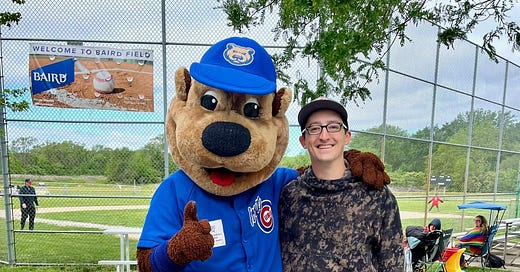Reviving a 70 Year-Old Little League
Raccoon Valley Little League is finding new life, thanks to Ross Edwards and a deep belief in the power of neighborhood sports.
I’m sure some of your favorite summer memories involve aluminum bats, the smell of fresh-cut grass, and Saturday mornings at the ballpark watching our kids chase fly balls and cheering them on from the bleachers. There’s no question that community baseball has long been a thread in the fabric of our Iowa towns, and few places exemplify that spirit better than the 70 year-old Raccoon Valley Little League in Des Moines. The league began in 1955, with two diamonds at 31st Street and Grand Avenue. Over the years, RVLL moved to it’s current location off Park Avenue and is considered one of the oldest Little Leagues west of the Mississippi River.
That’s why I was so moved sitting down with Ross Edwards for this episode of Maxwell's Iowa CoffeeCast. Ross played little league baseball alongside my kids at Racoon Valley. He went off to college, traveled abroad to teach English and returned home to Iowa, seeking a reconnection with those familiar baseball fields where he learned the game. What started next as a coaching gig became an unexpected mission to revive a fading community tradition that was such an integral part of his childhood and teen years.
Ross is 31 now, but his roots in Raccoon Valley run deep. “My earliest memory was being on the T-ball Cardinals at age three,” he told me. “I don’t remember a lot about the team, but my mom has a photo. Funny thing is, some of the kids in that picture became my classmates in middle and high school. We met playing baseball before we ever shared a classroom.”
That story stuck with me. Because that’s what Little League is about: not just learning the fundamentals of the game, but planting seeds of connection that grow as kids grow. For Ross, it did more than that. It eventually became a call to action.
The Decline of Local Leagues
In recent years, leagues like Raccoon Valley have been squeezed from all sides. The rise of elite travel baseball has pulled players and resources toward profit-driven club programs. Meanwhile, local leagues operate as nonprofits, dependent on volunteers and modest registration fees to survive. Add to that the impact of COVID, and many neighborhood diamonds began to lose their luster.
“I think things really started to slide in the late 2010s,” Ross said. “Then COVID hit, and that was huge. A lot of the longtime board members were older. They stepped away. And with them, a lot of knowledge and systems left too.”
When Ross returned to Raccoon Valley in 2022, it wasn’t with an agenda. He just wanted to coach. But the state of the park caught him off guard.
“I remember standing on the field and thinking, this place is exactly the same as when I was a kid—but not in a good way. Same dugouts. Same fences. Things had been left untouched for a long time.”
That led to a conversation with the league president, who invited Ross to a board meeting. “At first I was overwhelmed,” he said. “But the more I saw how much help was needed, the more I realized I could give back.”
Turning Things Around
Ross didn’t wait for someone else to fix it. He planned and executed a golf outing that raised $7,000, which was more than the league had brought in from sponsorships in years. That one event sparked hope.
“It showed people that there’s still pride here,” Ross said. “It helped the board believe we could make a comeback.”
Since then, Ross has stepped into the president role. He’s been leading efforts to improve facilities, coordinate volunteers, and build momentum around the league. And it’s working. Registrations are up. New dugouts are in. The grass is greener. And perhaps most importantly, families are starting to believe in the league again.
“We’re seeing kids come back,” Ross said. “And families talk. They see the improvements, and it spreads by word of mouth.”
The Value of Volunteers
Ross is quick to point out that financial donations are helpful, but what the league really needs is time.
“There’s always a need for volunteers,” he said. “Concessions, coaching, field maintenance, fundraising, or just helping out for a few hours—it all adds up.”
He’s even reached out to local churches to try to find retirees who might enjoy helping with mowing or maintenance.
“There are plenty of guys who love riding a mower or pulling weeds. It’s just about connecting the right people with the opportunity to help.”
And it’s not just about the adults. The kids, too, are responding to the renewed energy.
Coaching the Sandlot Generation
Ross now coaches 11- to 13-year-olds, which is his favorite age group. “They’re old enough to start getting it but still young enough to listen,” he said. “You see real growth at that age.”
When I asked him what the hardest part is, he laughed: “Keeping them on task. Some of them want to chat more than play. But that’s part of it. Sports teach you how to focus and how to have fun at the same time.”
He shared stories of kids lighting up after getting their first hit or making a play they didn’t think they could. And the joy in his voice reminded me of why we all fell in love with the game in the first place.
More Than a Game
Little League isn’t just about baseball. It’s about identity and connection. Ross still works with some of the same guys he played alongside as a kid. “That’s a full-circle moment,” he said. “The people I met in Little League are still part of my life. That motivates me to give that experience to today’s kids.”
In a world dominated by screens and digital distractions, neighborhood sports offer something tangible. “A lot of kids spend time on Fortnite now,” Ross said. “But on the field, they get real social time. They build confidence. They make friends face-to-face.”
Looking Ahead
Ross doesn’t pretend Raccoon Valley is going to become a mega-complex overnight. But that’s not the goal. “We don’t need turf fields and six-figure budgets,” he said. “We need dugouts that don’t leak, grass that gets mowed, and enough volunteers to make things run smoothly.”
He’s optimistic. The energy is shifting. New families are signing up. And the league’s 70th season has become a symbol of revival.
When I asked what it means to him personally, Ross paused. “I thought I was just signing up to coach. But this became something more. It became a way to give back to the place that gave me so much.”
Want to Help?
If you’re someone with time, energy, or even just a mower to share, leagues like Raccoon Valley need you. You can reach Ross directly at raccoonvalleyll@gmail.com. Or CLICK HERE to learn more. And if you’re not in the Des Moines area, I bet there’s a Little League near you with a board meeting coming up.
Subscribe to Maxwell’s Iowa CoffeeCast on Spotify, Apple Podcasts, or wherever you listen. For more local stories like this, visit maxwells-iowa.captivate.fm.







Something so pure and perfect about little league, thanks Maxwell for sharing!